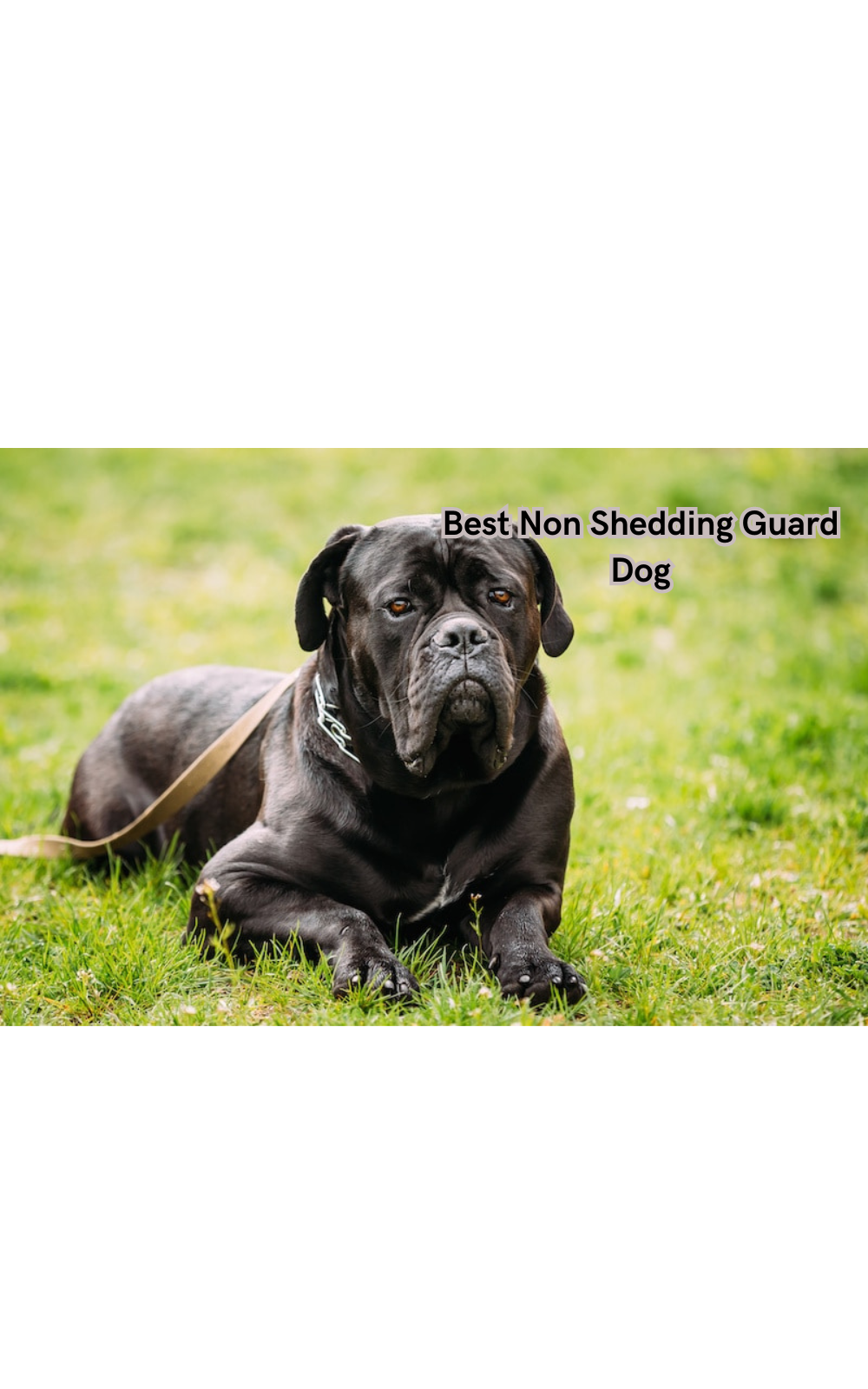Best Non Shedding Guard Dog
From the affectionate Poodle to the devoted Schnauzer, non-shedding guard dogs come in a variety of sizes and temperaments, making it easier to find the perfect match for your lifestyle.

Looking to add a furry companion to your family without the hassle of excessive shedding? Non-shedding guard dogs can offer the perfect balance of loyalty, protection, and minimal maintenance.
These intelligent and protective breeds are ideal for individuals or families seeking a pet that won't leave a trail of fur throughout the home.
From the affectionate Poodle to the devoted Schnauzer, non-shedding guard dogs come in a variety of sizes and temperaments, making it easier to find the perfect match for your lifestyle. Let's explore the top non-shedding guard dog breeds and discover which one might be the best fit for you!
What Does Non Shedding Mean?
Non-shedding guard dogs are breeds that do not shed or shed very minimally. Shedding is the natural process of losing old and damaged fur, but some breeds shed more than others due to their coat type and genetics. Dogs shed for various reasons, such as seasonal changes, hormonal imbalances, or health issues. Non-shedding guard dogs are ideal for individuals with allergies or those who prefer a cleaner living space.
Non-shedding dogs have a single coat with hair instead of fur that grows continuously, similar to human hair. This means they require regular grooming, but their coat does not shed like a fur coat would. Dog sheds can trigger allergies, so non-shedding breeds are a suitable option for people with allergies.
If All Dogs With Fur Shed, How Can a Dog Be Hypoallergenic?
While no dog is truly hypoallergenic, non-shedding guard dogs are considered a better option for individuals with allergies. This is because their reduced shedding means there is less dander (dead skin cells) and hair around the home that can trigger allergic reactions. Hypoallergenic guard dog breeds are typically those with hair, as opposed to fur, and produce less dander.
However, it's important to note that all dogs produce some level of dander and saliva, which are common allergens. If you have severe allergies, it's important to spend time with the breed you're considering before making a decision. Hypoallergenic guard dogs may still cause allergic reactions in some individuals.
Considerations to Keep in Mind When Selecting a Guard Dog
When it comes to selecting the best non-shedding guard dog, there are a few factors to consider. These include:
- Temperament: A good guard dog should be loyal, protective, and trainable. They should also have a calm and confident demeanor.
- Size: The size of your guard dog can impact their ability to protect your home. Larger breeds may be more intimidating to intruders and have a stronger physical presence, but smaller breeds can also make great guard dogs with proper training and socialization.
- Grooming Needs: Non-shedding dogs require regular grooming to maintain their coat, so it's important to consider the time and cost associated with this aspect
- Exercise Requirements: Guard dogs are typically energetic and require regular physical activity to be healthy and happy. Make sure you can provide your chosen breed with the exercise they need.
- Lifestyle Compatibility: Consider your lifestyle and living situation when choosing a guard dog. Some breeds may do better in certain environments or with certain types of owners. For example, some breeds may not do well in apartments due to their high energy levels.
Tips for Finding and Owning Non-Shedding Guard Dogs
- Research and learn about different non-shedding breeds to find the best fit for your lifestyle and needs.
- Find a reputable breeder or rescue organization when adopting a non-shedding guard dog. This will ensure you are getting a healthy and well-bred dog.
- Properly socialize and train your non-shedding guard dog from an early age to ensure they are well-behaved and obedient.
- Regularly groom your dog to keep their coat healthy and minimize shedding. This can also be a great bonding activity for you and your furry companion.
- Provide adequate exercise and mental stimulation for your guard dog to prevent behavioral issues. This can include daily walks, playtime, or training sessions.
- Consult with a veterinarian on the specific dietary and healthcare needs of your chosen breed. Non-shedding dogs may have different requirements than other breeds.
- Be a responsible owner by providing a safe and loving home for your non-shedding guard dog. This includes regular check-ups, vaccinations, and proper training and socialization.
An ideal guard dog is not just about being non-shedding but also having the right temperament and training to protect your home and loved ones effectively.
Importance of Guard Dogs for Security
Guard dogs have been used for centuries to protect homes and properties. With their instincts and protective nature, they can serve as a reliable line of defense against intruders. However, not all guard dogs are created equal when it comes to shedding. Some breeds shed heavily, while others barely shed at all. This is why choosing a non-shedding breed is essential for those seeking a guard dog that won't leave behind a trail of fur.
In addition to their security capabilities, guard dogs also offer companionship and can be trained to assist with various tasks, such as retrieving items or providing emotional support. They are loyal and dedicated members of the family, making them an ideal choice for individuals seeking both protection and companionship in a pet.
Non-Shedding Does Not Mean No- or Low-Maintenance
While non-shedding guard dogs may require less clean-up than their shedding counterparts, they still require regular grooming, exercise, and training. It's important to understand the commitment and responsibility that comes with owning a dog, regardless of their shedding tendencies.
However, for those seeking a pet without the added hassle of excessive shedding, non-shedding guard dogs can be the perfect choice.
Top Non-Shedding Guard Dog Breeds
- Staffordshire Bull Terrier
- Giant Schnauzer
- Portuguese Water Dog
- Airedale Terrier
- Yorkshire Terrier
- Kerry Blue Terrier
Let's dive deeper into each of these breeds to understand their characteristics and why they make great non-shedding guard dogs.
Staffordshire Bull Terrier:
Known for their courage and loyalty, this breed is alert and makes an excellent guard dog. They are also highly trainable and have minimal shedding, making them a popular choice for those seeking a non-shedding guard dog. These are good guard dogs for families with children, as they are gentle and affectionate.
Giant Schnauzer:
This breed is known to be alert, intelligent, and protective. With minimal shedding, they make excellent guard dogs that can also excel in other activities, such as obedience or tracking. They require regular grooming but have a low-maintenance coat that doesn't shed excessively. This dog breed is also good for families with children as they are playful and loving.
Portuguese Water Dog:
Originally bred to assist fishermen, this breed is highly trainable, intelligent, and protective. They have a hypoallergenic coat that requires regular grooming but sheds very little. They are also known for their friendly and affectionate nature, making them great companions in addition to being reliable guard dogs.
Airedale Terrier:
This breed is confident, intelligent, and protective, making them great guard dogs. They have a minimal shedding double coat that requires regular grooming to maintain its appearance. They are also known for their playful and energetic nature, making them an excellent choice for active owners.
In size, the Airedale Terrier is one of the largest terriers, making them a good deterrent for intruders. So, it's an effective guard dog breed with minimal shedding.
Yorkshire Terrier:
Known for their small size and hypoallergenic coat, this breed makes a great non-shedding guard dog for those with limited space. They are alert, intelligent, and loyal, making them excellent watchdogs.
However, their small size may not make them the best choice for families with young children. Its non shedding coat makes it a perfect guard dog for people with allergies. With obedience training, they can be trained to protect their territory.
Kerry Blue Terrier:
This breed is energetic, intelligent, and protective. They have a low shedding coat that requires regular grooming to maintain its appearance. They are also known for their loyalty and affection towards their owners, making them an excellent choice for both protection and companionship.
However, they may not be the best fit for families with small pets as they have a high prey drive.
Care and Maintenance of Non-Shedding Guard Dogs
As mentioned before, non-shedding guard dogs still require regular grooming and exercise. This includes:
- Brushing their coat to prevent matting and remove dead hair
- Bathing as needed with a gentle dog shampoo
- Trimming their nails regularly
- Providing plenty of exercise and mental stimulation through activities like walks, playtime, or training sessions
It's also important to consult with a veterinarian on the specific dietary and healthcare needs of your chosen breed. Great family dogs come in all shapes and sizes, but non-shedding guard dogs require a certain level of commitment and responsibility.
FAQs
Is it normal for dogs to sleep all day?
Yes, dogs need an average of 12-14 hours of sleep per day. This is normal and necessary for their overall health and well-being.
What is the least aggressive guard dog?
The least aggressive guard dog would be one that is trained and socialized properly. Generally, breeds such as Golden Retrievers or Labrador Retrievers have a friendly and sociable temperament, making them less likely to act aggressively towards strangers.
What dog is attacked the most?
According to statistics, small breeds such as Chihuahuas or Dachshunds are more prone to being attacked due to their size and tendency to be protective of their owners. However, it's important to note that any breed has the potential to become aggressive if not properly trained and socialized.
What dogs can beat a wolf?
It would be difficult for a domestic dog to defeat a wolf in a fight, as wolves are strong and skilled predators. However, certain breeds, such as Caucasian Shepherds or Kangals, have been known to protect their flocks from wolves. In most cases, it's best to avoid any confrontations with wild animals and ensure your dog is properly trained and restrained when outdoors.
Conclusion
In conclusion, the search for the best non-shedding guard dog encompasses a careful balance of traits that offer both security and compatibility with various living environments. From the alert and affectionate Schnauzer to the spirited and protective Bichon Frise, non-shedding breeds present a diverse array of options for individuals and families seeking a loyal guardian without the concern of excessive shedding.
These intelligent and trainable companions not only provide a hypoallergenic environment but also offer unwavering loyalty and protection. By considering factors such as size, temperament, and exercise needs, prospective owners can find an ideal non-shedding guard dog that aligns with their lifestyle. Ultimately, the decision to welcome a non-shedding guard dog into one's life represents a commitment to a loving, low-maintenance pet that also serves as a devoted protector.
